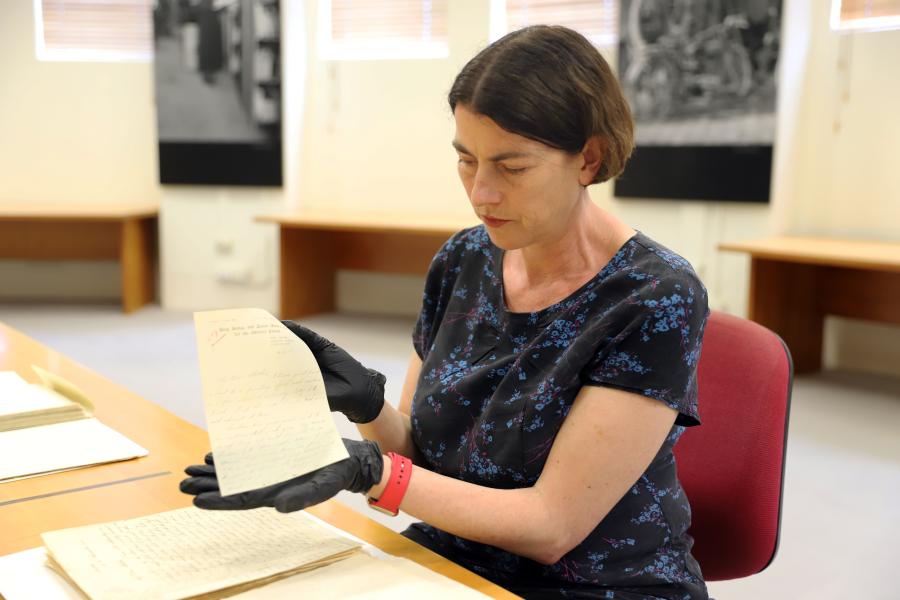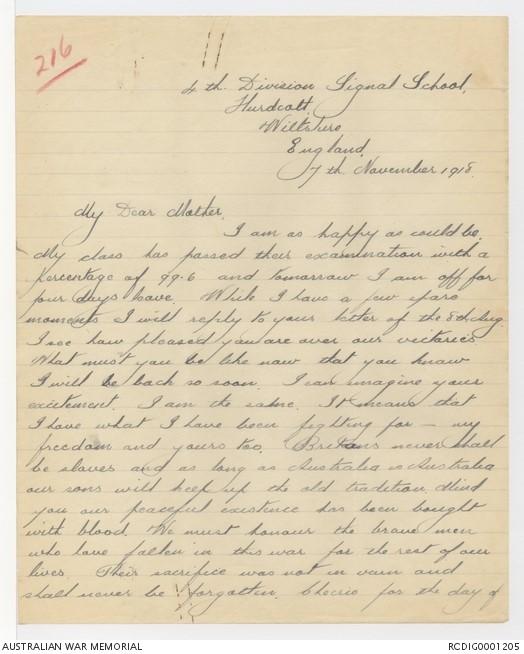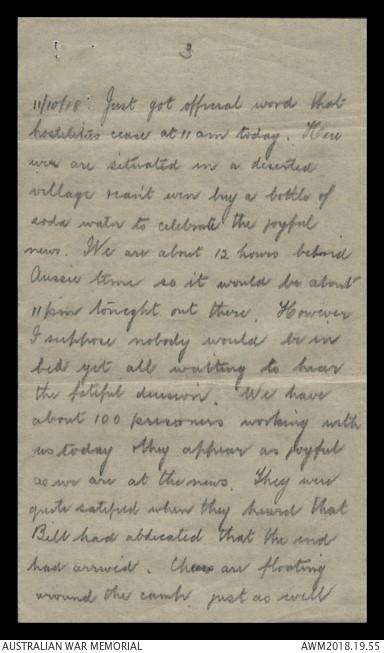Remembering the end of the First World War

Robyn Van Dyk, Head of the Australian War Memorial Research Centre, examines a letter from the First World War.
Every year at 11 am on 11 November, Australians take a minute of silence to reflect and remember those who fought for Australia across all wars and armed conflicts. Although the name was not made official until 1997, this day is known as Remembrance Day. It serves as a reflection on the sacrifice of those who served. The date for Remembrance Day commemorates the Armistice of the First World War, which was signed at 11 am on 11 November 1918.
The news of the Armistice came to the Australian forces when most were having a period of rest behind the front lines on the Western Front. There are a multitude of stories recorded in the letters and diaries held at the Memorial that reflect on the signing of the Armistice and the war coming to an end. Many wrote of feeling relief that they did not have to fight anymore. However, there was sometimes a hint of disbelief in the Armistice, due to the suddenness of the news and because many could not tell that the war was over. Despite this, Australians took part in and recorded various celebrations of the long awaited conclusion to the war. Many of these eyewitness accounts of the days leading up to the Armistice and after war’s end are now digitised and available online.
Private John Turnbull was a 31-year-old engine driver in Geelong before he enlisted in the Australian Imperial Force (AIF) on 11 November 1914. He served as a driver with the 5th Divisional Ammunition Column on the Western Front, returning to Australia on 29 January 1919.
Turnbull records the build up towards the Armistice writing on 4 November 1918: “Austria has surrendered. Germany fights a lone hand. The Italians have captured 300,000 Austrian troops and 5,000 guns … Fritz is hurrying home to his beloved fatherland and is not thinking too much of ‘Dutch land uber allies’ [sic].” Turnbull reflected that this signalled that something was coming to an end. Over the coming days he witnessed the increase in demands for peace, especially from the “Hun envoys” on 9 November 1918, when the envoys “asked for a cessation of hostilities while they discussed terms. [However the] Marshall ... refused to discuss peace terms, demanding unconditional surrender within 72 hours or to fight on.”
When the Armistice was signed on 11 November 1918, Turnbull witnessed an Australian soldier ask a general if the Armistice had been signed yet. The general replied, “I might have known you are an Australian. The armistice was signed at 11 o’clock this morning.” Turnbull was surprised that the Armistice had been signed, as he and his battalion were marching to their next destination. Turnbull expresses relief, however there was a hint of belief that the fighting wasn’t going to stop immediately.

Private Wilfred Denver Gallwey, 2DRL/0785 page 74
Eighteen-year-old Private Wilfred Gallwey recorded his war experiences, based upon his letters and diaries, in three large bound volumes. These were used by C.E.W. Bean to help compile the official history of the battle of Bullecourt. From London, Gallwey recorded in a series of letters to his mother the anticipation of the Armistice and its aftermath. On 7 November 1918, Gallwey wrote about how excited his mother must be to “know I will be back soon”, and that they will have achieve what Gallwey has “been fighting for – my freedom and yours too”. Gallwey expresses hope that he will eventually be coming home, and that he will have fulfilled his duty.
On 11 November 1918, Gallwey wrote to his mother about the celebrations that overtook London after the news of the Armistice being signed: “London has gone mad and I am intoxicated with joy. Women have never been so free. I have been mobbed and kissed and hugged to death. The happiest days I have had for years.” The celebrations of the war ending lasted several days, Gallwey wrote: “I simply cannot return to camp while all this fun is going on. I am mad with excitement at present.” Gallwey wrote of immediate relief that the war has come to an end, and he revelled in the celebrations and joy.

Diary of Alexander Sutherland Mackay, 1DRL/0441 page 3
Alexander Mackay was employed as a bank manager at the Bank of Australasia in Brisbane before enlisting on 1 July 1916. In 1917 he was transferred to the 3rd Division Artillery, which he served with in France until September, when he joined the 30th battery of the 8th Field Brigade, which he remained with until the end of the war.
Mackay recorded in his diary the aftermath of the Armistice. His immediate reaction was relief that the war had come to an end: “just got official word that hostilities cease at 11am today. Here we are situated in a deserted village & can’t even buy a bottle of soda water to celebrate the joyful news. We are about 12 hours behind Aussie time so it would be about 11pm tonight out there. However I suppose nobody would be in bed yet all waiting to hear the fateful decision.” Over the next few days he noted, “have had beautiful weather since the guns closed up. It’s a relief [at] night using uncovered lights, no necessity to get down below ground for fear of bombs’. Mackay does express some doubt ‘can hardly realize yet that hostilities have ceased, [they] are simply doing the routine business away from all the excitement’ it is ‘almost impossible to realise the war is over.”
The Memorial is progressively digitising and publishing on our website these important records of war - use collection search to discover more collections online.
